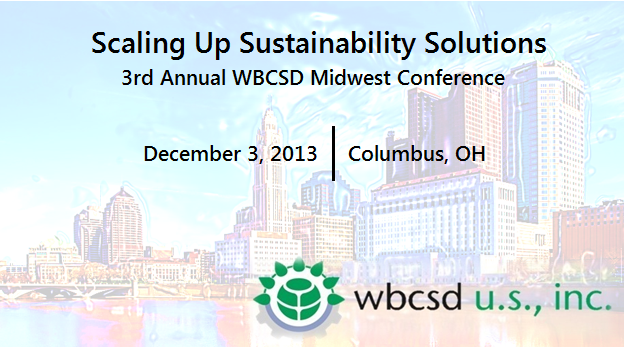Among the discussed solutions, inclusive business opportunities figured high on the agenda. Building on the conviction that the private sector has a crucial role to play in reducing poverty, and that there is a solid business case in doing so, the WBCSD originally coined the inclusive business concept in 2005. It refers to commercially viable, scalable business solutions that expand access to goods, services and livelihood opportunities for the approximately 4 billion people living at the base of the economic pyramid, representing a market of over US$ 5 trillion a year.
I had the privilege of moderating a panel discussion in Columbus, and kicked off the discussions by emphasizing that by linking business core operations to key development challenges, inclusive business solutions go beyond philanthropy and CSR, and therefore have a significant potential for scale. I underscored that creating a virtuous cycle of business development and socio-economic progress requires focusing both on offering more affordable goods and services, as well as on creating new income and livelihood opportunities for lower-income communities. Or, as we like to put it: the aim of Inclusive business is not to fight for a larger share of small wallet, but to increase the size of wallet.
After my introduction, we had the pleasure of hearing three perspectives from senior executives of WBCSD members from three different sectors, who highlighted various options of applying inclusive business in practice.
Gabriela Burian, Monsanto’s Director of Sustainable Agriculture Ecosystems, outlined her company’s commitment to increase the income of at least 5 million additional resource-poor small farmers, and their contribution to food security by enhancing access to market information, more productive farming techniques and technologies, as well as finance and risk sharing mechanisms.
For his part, Scott Griffin, Chief Sustainability Officer at Greif, shared examples of his company’s initiatives to meet the needs of the poor and creating micro-business opportunities, including PackH2O™, an innovative solution to water transportation and storage that relieves physical burden and protects against contamination.
Lastly, Gerard Ostheimer, seconded by Novozymes as a Global Lead for Sustainable Bioenergy to the UN Sustainable Energy for All initiative, emphasized the relevance of providing access to energy as a fundamental enabler for growth at the base of the pyramid.
Acknowledging that in spite of notable examples of large companies succeeding at the base of the pyramid, relatively few ventures have achieved the potential for scale, the subsequent roundtable and plenary discussion focused on overcoming the main internal (within enterprises) and external (regulatory and structural) barriers.
Among the most important barriers identified were the opportunity costs of inclusive business ventures - i.e. their comparatively small size, higher perceived risk and lower expected rate of return. This frequently makes it challenging for inclusive business projects to be approved vis-à-vis alternative investment opportunities. As promising solutions to overcome this challenge the need for CEO leadership and sources of outside financing were mentioned. The latter could include both soft loans from development financing institutions as well as well as combining public and private financing to lower risks and enhance returns on inclusive business investments.
Participants also discussed the relevance of the inclusive business approach for the home market. Examples of “reverse innovation” – inclusive business innovations that were first developed for the developing world before spreading to the US market – were highlighted. A consensus emerged that there is substantial potential for scaling the implementation of such projects to improve the livelihood opportunities of lower income populations in the US – both to of the benefit of the target groups and the companies involved.
For those wishing to read more about barriers to scale in the inclusive business domain, make sure to check out our recently released issue brief titled Scaling up Inclusive Business – Solutions to overcome internal barriers.
By Marcel Engel, Managing Director, WBCSD Social Capital Focus Area


